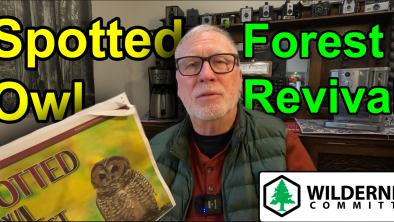Glimmer of hope for B.C.’s endangered owls
Wednesday, May 21, 2014
VANCOUVER SUN

Northern spotted owl population shows small increase after campaign targets barred owl rival
A flourishing barred owl population is being sacrificed to help with recovery of endangered northern spotted owls in southwestern B.C.
The number of spotted owls known to exist in the wild in southwestern B.C. has increased by four in the past two years to 14 amid a wide-ranging management program that has included the killing and large-scale relocation of its chief competitor, the barred owl.
The latest status information on the spotted owls — provided by biologist Ian Blackburn of the Ministry of Forests, Lands, and Natural Resource Operations — shows that in addition to the 14 confirmed in the wild, there are 17 in captivity in B.C.
A total of 94 barred owls have been relocated away from spotted owl territory and another 39 have been killed by the ministry in recent years.
The goal of the spotted owl recovery program in Canada is 125 pairs, or 250 adults, which compares with an estimated 500 pairs before European settlement.
The U.S. Fish and Wildlife service is also spending $3.5 million over six years to remove 3,600 barred owls from sites in Oregon, Washington and California for the same reason. Contractors go to an area where barred owls are known to live, play a digital caller to attract them, and shoot the birds with a shotgun.
Ministry spokesman Greig Bethel could not provide a precise cost figure for the spotted owl recovery program, only that “several million dollars” have been spent since 1985.
Asked for killing methods in B.C., he would only say that owl calls are a common way to attract the owls and that the province is concentrating on relocation of the barred owls, not further killings.
Barred owls have been on the increase in the region in recent decades and can interbreed with spotted owls. Barred owls also eat a wider range of prey compared than the spotted owl, which prefers old-growth species such as flying squirrels.
The fate of most of the removed barred owls in B.C. is generally unknown, although one relocated 100 kilometres across three mountain ranges flew back to the spot where it was captured in the Stein Valley within a year.
Three of the four new spotted owls found in the wild in B.C. were in areas from which barred owls were removed, suggesting the program may be working.
The 17 captive owls include four adults and five young captured in B.C., and five young born in captivity at Mountain View Conservation and Breeding Centre in Langley. Another two young born in captivity in the U.S. and one young captured in the wild in the U.S. were imported to Mountain View, where eggs have been put into incubators to help improve the odds of successful births.
“We expect to start the releases of the young from these breeding owls once the current population of younger owls mature in the next few years and begin to produce offspring,” Blackburn said. In a setback, however, three of five owls in the U.S. assisting in the B.C. recovery program have died, one in 2012 and two more this year, resulting in the loss of the captive pairs there.
Joe Foy of the Wilderness Committee said the latest figures show “there is hope” for the spotted owl, but called on the ministry to put an immediate halt to all logging of old-growth forests in spotted owl habitat so that the owls to be released in future have somewhere to establish territories.
“Canada’s spotted owl population is barely holding on because of past over-logging of old growth forests,” he said.
Later this month, the committee will conduct a four-day tour of spotted owl wildlife habitat areas from the U.S. border north to Lillooet to check for signs of logging or other industrial activity, including mining and private run-of-river hydro projects.
Photo: This northern spotted owl chick was hatched at Mountain View Conservation and Breeding Centre in Langley.


